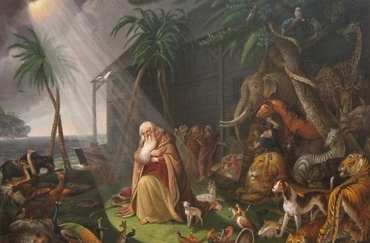Apocalypse Revealed #337
337. And the kings of the earth and the great men, the rich men and the commanders, and the powerful, and every slave and every freeman. (6:15) This symbolizes those people who before the separation had possessed an understanding of truth and good, a knowledge of their concepts, and learning, acquired from others or on their own, and yet who lacked a life in accordance with them.
All these things are symbolized in turn by these classes of people, and this no one can know but one who knows what kings, great men, rich men, commanders, the powerful, and a slave and a freeman mean symbolically. In the spiritual sense kings symbolize people who possess truths; great men, people who possess good qualities; rich men, people who possess concepts of truth; commanders, people who possess concepts of goodness; the powerful, people who possess learning; slaves, people who acquire these things from others, thus as a matter of memory; and freemen, people who acquire these things on their own, thus with judgment.
It would take too long, however, to confirm from the Word that these are the symbolic meanings of all these designations. We have previously shown what kings symbolize, in no. 20; and what rich men symbolize, in no. 206. What great men symbolize is apparent in Jeremiah 5:5, Nahum 3:10, Jonah 3:7; for greatness is predicated of goodness (nos. 896, 898). And we will see below that the powerful and slaves and freemen are people who possess learning, acquired from others or on their own.
We say that they possess these things and yet lack a life in accordance with them, since evil people, even the worst of them, can have a knowledge and understanding of concepts of truth and goodness, and a great deal of learning as well. But because they lack a life in accordance with them, they do not really possess them. For whatever resides in the intellect alone, and is not present at the same in a person's life, does not exist in the person, being outside of him, as though in a forecourt. But whatever is present at the same time in a person's life exists in the person, being within him as though in the house. Consequently these people are preserved and the former rejected.
Beast

In Genesis 1:24, beasts signify the things of man's will or loves. (Arcana Coelestia 44, 46)
In Genesis 9:10, beasts signify all that was living in the man of the Ancient Church, and also what belonged to his new will; likewise the lower things of his understanding and the will therefrom. (Arcana Coelestia 1026-1029)
In Psalm 104:20, beasts signify affections longing to be instructed, or spiritually nourished. (Apocalypse Explained 650[10])
In Luke 10:35, since the beast was a donkey, this signifies to instruct another according to his capability. (Apocalypse Explained 1154)
The beast of the south (Isaiah 30:6) signifies people who are principled in the knowledges of good and of truth, but do not apply them to life and instead to science.
Every beast and creeping thing (Genesis 8:19) signifies the goodnesses of the internal and external man.
"Beasts" represent the affection for doing good things, a true desire to do them from the heart. In the negative sense, "beasts" stand for the lust to do evil.
The beast ascending out of the sea (Revelation 13:1) signifies reasonings from the natural man confirming the separation of faith from life.
(References: Apocalypse Explained 13, 773; Revelation 13:11)






